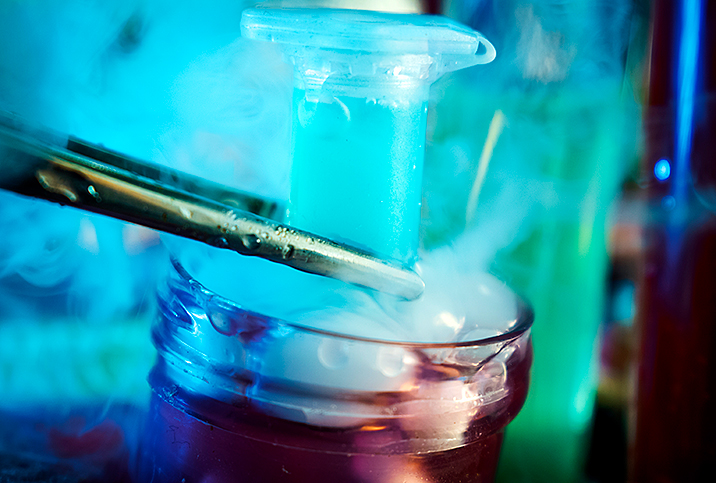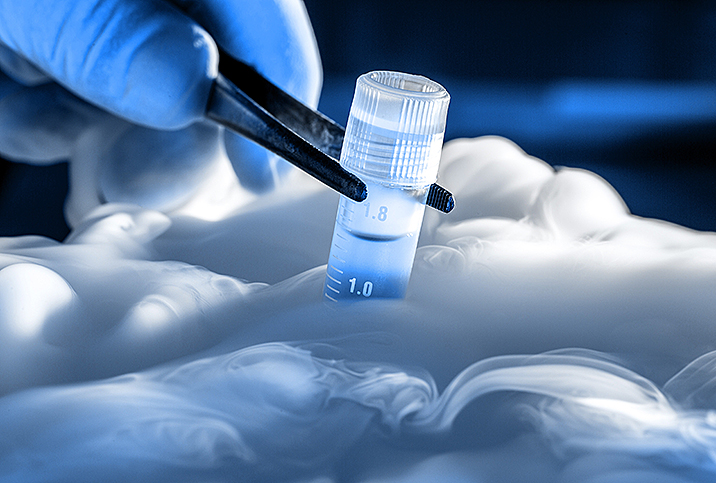The Many Reasons to Make a Deposit at the Sperm Bank

When a man and his partner are struggling to conceive, or he's staring at the reality of a serious medical challenge, difficult questions about fertility need to be addressed, including his options for preserving sperm.
"Most often, I have worked with men who were freezing their sperm in relation to infertility treatment they were actively undergoing with their partner, such as IVF [in vitro fertilization]," said Claire O'Neill, a certified andrology and embryology lab scientist based in New York. "Also, if they were about to start cancer treatment. Chemotherapy treatment is highly damaging to sperm, so men who may want to have children in the future may choose to freeze their sperm as a precaution."
Sperm banking or freezing, also called sperm cryopreservation, is a type of fertility preservation, according to the National Cancer Institute. While looming chemo is a primary driver of many people's decision to bank sperm, there are other reasons that exist.
Barrett Cowan, M.D., has specialized in treating men with infertility for more than 20 years and is the president and chief medical officer at Posterity Health in Parker, Colorado. Cowan, also a male fertility specialist at Kindbody fertility clinic, explained there are usually three main reasons for men to bank their sperm:
- Fertility preservation in advance of chemotherapy or radiation therapy for cancer
- To keep future options open before they get a vasectomy
- To guard against the deterioration of sperm quality associated with aging, because there is an increased incidence of miscarriage, birth defects, autism and schizophrenia in the children of older men
There are other reasons, too, including one that was all over the news several years ago, which remains a health concern.
"One of these is traveling to a country with a high risk of getting the Zika virus," said O'Neill, who is the cofounder of FertilitySpace, a website that helps men and women find fertility clinics in their area so they can compare their options and find the best match for their needs. "Zika infection can cause congenital disabilities in pregnant women, so men currently trying to conceive with their female partner would often freeze sperm before travel just in case."
Interestingly, Zika can remain in semen longer than in any other bodily fluid, so the Centers for Disease Control and Prevention (CDC) recommends men wait three months after traveling to a high-risk Zika area before trying to conceive. O'Neill said that when she worked at a large New York fertility clinic, men who froze sperm for Zika reasons did so on a short-term basis.
Gender reassignment therapy is another reason people bank sperm.
"Men undergoing gender reassignment who want biological children in the future may want to consider freezing their sperm before starting hormone treatment, as estrogen therapy can halt spermatogenesis [the production of sperm]," O'Neill said.
Banking for cancer treatment
Doctors typically offer information on sperm banking to any man (or adolescent boy who has been through puberty) undergoing cancer treatment that may affect their fertility.
"I strongly encourage patients to cryopreserve sperm before initiating cancer therapy, even if they have no desire to do so," Cowan said. "Patients are frequently overwhelmed with learning about a new cancer diagnosis, and they may not even be thinking about fertility preservation. Cancer therapy frequently results in irreversible infertility. After being treated, fertility can become a major concern when getting back to a 'normal' life, so banking sperm in advance of therapy is critical. It will keep future options open for fathering a child."
Of course, choosing to bank your sperm is a personal decision. Each individual should have this conversation with their physician, O'Neill agreed, adding that based on her experience as an andrologist, men in high-risk jobs—such as serving in the military or as a police officer—should consider freezing their sperm.
"Perhaps it's an unexpected conversation to have with your partner, but I think it's always good to discuss family planning in these types of cases," she said. "Sperm freezing also may be something to consider if you're routinely exposed to any toxic chemicals or radiation in your job that could affect sperm health."
What's the process of sperm banking?
If you have any concerns about sperm banking, it's about as complicated as using an ATM.
"Banking sperm is a very easy process," Cowan said. "After connecting with a sperm bank, the individual will typically provide two to three individual ejaculate samples into specimen containers."
Basically, you go to a sperm bank and masturbate into a cup. Simple. What happens to the semen in the cup? Leave that to the lab team, including andrologists, who specialize in male reproductive issues.
"I've personally processed and frozen thousands of semen samples," O'Neill said. "First, a man will come into the lab and produce a semen sample in a production room. Once he provides the sample, it sits to liquefy for about 15 minutes, and then an andrologist gets to work."
Before freezing the sperm, most labs process the sample, conducting a semen analysis to look at several facets:
- pH, the sperm's level of acid or alkaline
- Volume, the amount of sperm produced in ejaculate
- Sperm concentration, the number of sperm per milliliter of semen
- Motility, the ability of the sperm to swim properly
- Morphology, the size and shape of the sperm
In other words, the lab examines the amount of sperm in the sample, how many are able to move and whether they have any physical defects. If the sample is found to be below normal thresholds on any parameters, your physician may suggest you come in a second time to freeze an extra sample. After evaluating the sample, the technicians process it to remove any immotile (nonmoving) sperm and prepare it for freezing.
"Then comes the freezing step," O'Neill said. "The andrologist will complete one final analysis, so that you know how many sperm will actually be frozen and their motility. This way, your doctor knows what to expect when you thaw the sample in the future."
During this step, a special freezing medium is added, as the sample is mixed to distribute the sperm evenly and split into vials. The vials are immediately put into a tank of liquid nitrogen to freeze them.
There is no set number of vials from donor to donor. This depends on how the person plans to use the sperm in the future, as well as the doctor's recommendation.
Find a good sperm bank and compare costs
The best step for a man to take when they're considering sperm banking is to speak with a reproductive urologist—a male fertility expert—so they can give personalized guidance about local options, Cowan said.
"Get a referral from your urologist to see what makes the most sense for you," O'Neill added.
She recommends alternatives for anyone looking for fertility clinics or long-term sperm storage companies, and her website lists facilities and reviews. Two established companies with programs for long-term storage are California Cryobank and Fairfax Cryobank, which has several branches around the country. A newer company called Legacy, based in Boston, offers sperm testing kits and long-term sperm storage.
Insurance may cover fertility preservation for some people, O'Neill pointed out, but the process is fairly affordable even for those without coverage.
"The prices vary, but sperm freezing [including semen analysis] varies from $600 to $1,000," she said. "Sperm storage costs can be anything from $100 to $600 per year, but at long-term storage facilities, they sometimes offer a discount for multiyear storage."
Costs vary significantly from center to center, so comparing prices at clinics in your area is essential.
Key points to remember and questions to ask
O'Neill pointed out a few details to think about if you are going to bank sperm:
- Keep in mind you'll likely need infectious disease bloodwork done before freezing your sperm. This testing is often covered by insurance, but definitely check into it.
- You may have to provide a second sample if your semen parameters are below normal thresholds. It's always good to have more sperm frozen than you think you'll need, because not every attempt at conception results in pregnancy.
- You will need to choose a method of infertility treatment to conceive with the sample. This doesn't necessarily mean you have to use IVF, which can be very costly, but you and your partner may consider using intrauterine insemination (IUI) at a fertility clinic.
Marlene Stensballe Vium, a director at the male fertility company ExSeed Health, who previously worked in logistics for the European Sperm Bank, added some points to discuss with your medical team:
- Make sure the sperm bank tests semen quality and gives you the results, specifically the chances of pregnancy with your semen quality and whether there are any abnormalities.
- You need to know how many vials or straws you have stored.
- Ensure you have enough samples in case your partner has difficulty getting pregnant and wants more kids. Insemination requires nine straws on average.
- Make sure you know the policy for destroying the straws you have in storage and payment conditions.
- If you are storing sperm for later use in an IVF cycle, discuss your options with an experienced fertility doctor and/or counselor.
"If one has any doubts on whether to bank sperm, I would recommend doing it as an insurance policy for maintaining future fertility," Cowan advised. "It is generally a cost-effective option for providing peace of mind. It offers options for the future, when one's situation or desire to have children may change."




















